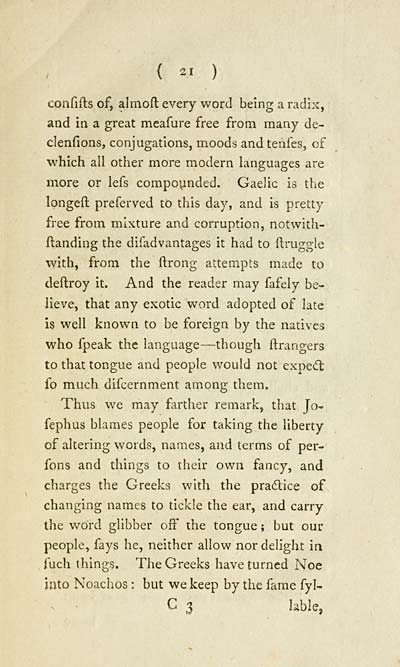Ossian Collection > Defence of the Scots Highlanders, in general; and some learned characters, in particular
(31)
Download files
Complete book:
Individual page:
Thumbnail gallery: Grid view | List view

{ ^I )
confifls of, almoft every word being a radix,
and in a great meafure free from many de-
clenfions, conjugations, moods and tenfes, of
which all other more modern languages are
more or lefs compounded. Gaelic is the
longeft preferved to this day, and is pretty
free from mixture and corruption, notwith-
ftanding the difadvantages it had to ftruggle
with, from the ftrong attempts made to
deftroy it. And the reader may fafely be-
lieve, that any exotic word adopted of late
is well known to be foreign by the natives
who fpeak the language — though ftrangers
to that tongue and people v/ould not expeift
fo much difcernment among them.
Thus w^e may farther remark, that Jo-
fephus blames people for taking the liberty
of altering words, names, and terms of per-
fons and things to their own fancy, and
charges the Greeks with the pradlice of
changing names to tickle the ear, and carry
the word glibber off the tongue ; but our
people, fays he, neither allow nor delight ia
fuch things. The Greeks have turned Noe
into Noachos : but we keep by the fame fyl-
C 3 lable,
confifls of, almoft every word being a radix,
and in a great meafure free from many de-
clenfions, conjugations, moods and tenfes, of
which all other more modern languages are
more or lefs compounded. Gaelic is the
longeft preferved to this day, and is pretty
free from mixture and corruption, notwith-
ftanding the difadvantages it had to ftruggle
with, from the ftrong attempts made to
deftroy it. And the reader may fafely be-
lieve, that any exotic word adopted of late
is well known to be foreign by the natives
who fpeak the language — though ftrangers
to that tongue and people v/ould not expeift
fo much difcernment among them.
Thus w^e may farther remark, that Jo-
fephus blames people for taking the liberty
of altering words, names, and terms of per-
fons and things to their own fancy, and
charges the Greeks with the pradlice of
changing names to tickle the ear, and carry
the word glibber off the tongue ; but our
people, fays he, neither allow nor delight ia
fuch things. The Greeks have turned Noe
into Noachos : but we keep by the fame fyl-
C 3 lable,
Set display mode to: Large image | Transcription
Images and transcriptions on this page, including medium image downloads, may be used under the Creative Commons Attribution 4.0 International Licence unless otherwise stated. ![]()
| Early Gaelic Book Collections > Ossian Collection > Defence of the Scots Highlanders, in general; and some learned characters, in particular > (31) |
|---|
| Permanent URL | https://digital.nls.uk/78817506 |
|---|
| Description | Selected books from the Ossian Collection of 327 volumes, originally assembled by J. Norman Methven of Perth. Different editions and translations of James MacPherson's epic poem 'Ossian', some with a map of the 'Kingdom of Connor'. Also secondary material relating to Ossianic poetry and the Ossian controversy. |
|---|
| Description | Selected items from five 'Special and Named Printed Collections'. Includes books in Gaelic and other Celtic languages, works about the Gaels, their languages, literature, culture and history. |
|---|

